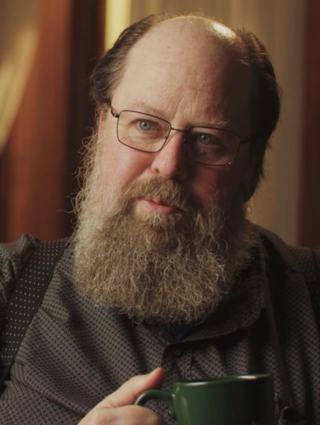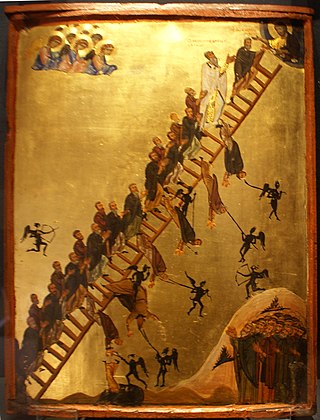Pre-existence, preexistence, beforelife, or premortal existence, is the belief that each individual human soul existed before mortal conception, and at some point before birth enters or is placed into the body. Concepts of pre-existence can encompass either the belief that the soul came into existence at some time prior to conception or the belief that the soul is eternal. Alternative positions are traducianism and creationism, which both hold that the individual human soul does not come into existence until conception or later. It is to be distinguished from preformation, which is about physical existence and applies to all living things.
Universalism is the philosophical and theological concept that some ideas have universal application or applicability.

The Last Judgment, Final Judgment, Day of Reckoning, Day of Judgment, Judgment Day, Doomsday, Day of Resurrection or The Day of the Lord is a concept found across the Abrahamic religions and the Frashokereti of Zoroastrianism.
The problem of Hell is an ethical problem in the Abrahamic religions of Christianity, Islam and Judaism, in which the existence of Hell (Jahannam) for the punishment of souls in the Afterlife is regarded as inconsistent with the notion of a just, moral, and omnipotent, omnibenevolent, omniscient supreme being. Also regarded as inconsistent with such a just being is the combination of human free will, and the divine qualities of omniscience and omnipotence, as this would mean God would determine everything that has happened and will happen in the universe—including sinful human behavior.

In Christian theology, universal reconciliation is the doctrine that all sinful and alienated human souls—because of divine love and mercy—will ultimately be reconciled to God. The doctrine has been rejected by most mainstream Christian churches, which tend to maintain at least the possibility that many are not saved, but it has received support from many prestigious Christian thinkers as well as many groups of Christians. It has been argued that the Bible itself has a variety of verses that seem to support a plurality of views.

Unlimited atonement is a doctrine in Protestant Christianity that states Jesus died as a propitiation for the benefit of all humans without exception. It is normally associated with Amyraldism, as well as Arminianism and other non-Calvinist tradition. It is a doctrine distinct from other elements of the Calvinist acronym TULIP and is contrary to the Calvinist doctrine of limited atonement.

David Bentley Hart is an American writer, philosopher, religious studies scholar, critic, and theologian. Reviewers have commented on Hart's baroque prose and provocative rhetoric in over one thousand essays, reviews, and papers as well as nineteen books. From a predominantly Anglican family background, Hart became Eastern Orthodox when he was twenty-one. His academic works focus on Christian metaphysics, philosophy of mind, Indian and East Asian religion, Asian languages, classics, and literature as well as a New Testament translation. Books with wider audiences include The Doors of the Sea, Atheist Delusions, That All Shall Be Saved, and Roland in Moonlight.

The Quinque viæ are five logical arguments for the existence of God summarized by the 13th-century Catholic philosopher and theologian Thomas Aquinas in his book Summa Theologica. They are:
- the argument from "first mover";
- the argument from universal causation;
- the argument from contingency;
- the argument from degree;
- the argument from final cause or ends.
The conditional preservation of the saints, or conditional perseverance of the saints, or commonly conditional security, is the Arminian Christian belief that believers are kept safe by God in their saving relationship with him upon the condition of a persevering faith in Christ. Arminians find the Scriptures describing both the initial act of faith in Christ, "whereby the relationship is effected", and the persevering faith in him "whereby the relationship is sustained." The relationship of "the believer to Christ is never a static relationship existing as the irrevocable consequence of a past decision, act, or experience." Rather, it is a living union "proceeding upon a living faith in a living Savior." This living union is captured in the simple command by Christ, "Remain in me, and I in you".

Trinitarian universalism is a variant of belief in universal salvation, the belief that every person will be saved, that also held the Christian belief in Trinitarianism. It was particularly associated with an ex-Methodist New England minister, John Murray, and after his death in 1815 the only clergy known to be preaching Trinitarian Universalism were Paul Dean of Boston and Edward Mitchell in New York.
The fate of the unlearned, also known as the destiny of the unevangelized, is an eschatological question about the ultimate destiny of people who have not been exposed to a particular theology or doctrine and thus have no opportunity to embrace it. The question is whether those who never hear of requirements issued through divine revelations will be punished for failure to abide by those requirements.

In Christian theology, Hell is the place or state into which, by God's definitive judgment, unrepentant sinners pass in the general judgment, or, as some Christians believe, immediately after death. Its character is inferred from teaching in the biblical texts, some of which, interpreted literally, have given rise to the popular idea of Hell. Theologians today generally see Hell as the logical consequence of rejecting union with God and with God's justice and mercy.
Eastern Orthodox theology is the theology particular to the Eastern Orthodox Church. It is characterized by monotheistic Trinitarianism, belief in the Incarnation of the divine Logos or only-begotten Son of God, cataphatic theology with apophatic theology, a hermeneutic defined by a Sacred Tradition, a catholic ecclesiology, a theology of the person, and a principally recapitulative and therapeutic soteriology.

In Christian theology, conditionalism or conditional immortality is a concept in which the gift of immortality is attached to belief in Jesus Christ. This concept is based in part upon another biblical argument, that the human soul is naturally mortal, immortality is therefore granted by God as a gift. This viewpoint stands in contrast to the more popular concept of the "natural immortality" of the soul. Conditionalism is practically synonymous with annihilationism, the belief that the unsaved will be ultimately destroyed, rather than suffer unending physical torment, in hell.
Christian universalism is a school of Christian theology focused around the doctrine of universal reconciliation – the view that all human beings will ultimately be saved and restored to a right relationship with God. "Christian universalism" and "the belief or hope in the universal reconciliation through Christ" can be understood as synonyms. Opponents of this school, who hold that eternal damnation is the ultimate fate of some or most people, are sometimes called "infernalists."

The lake of fire is a concept that appears in both the ancient Egyptian and Christian religions. In ancient Egypt, it appears as an obstacle on the journey through the underworld which can destroy or refresh the deceased. In Christianity, it is as a place of after-death punishment of the wicked. The phrase is used in five verses of the Book of Revelation. In the biblical context, the concept seems analogous to the Jewish Gehenna, or the more common concept of Hell. The image of the lake of fire was taken up by the early Christian Hippolytus of Rome in about the year 230 and has continued to be used by modern Christians.
In Christianity, annihilationism is the belief that after the Last Judgment, all damned humans and fallen angels including Satan will be totally destroyed, cremated, and their consciousness extinguished rather than suffering forever in Hell. Annihilationism stands in contrast to both the belief in eternal torment and the belief that everyone will be saved ("universalism"). However, it is also possible to hold to a partial annihilationism, believing unsaved humans to be obliterated or cremated, but demonic beings to suffer forever.

Elhanan Winchester was an American theologian who explored numerous theological paths before becoming an advocate for universal restoration. As a result, Winchester is considered among the early leaders of American Universalism.

Eternal life traditionally refers to continued life after death, as outlined in Christian eschatology. The Apostles' Creed testifies: "I believe... the resurrection of the body, and life everlasting." In this view, eternal life commences after the second coming of Jesus and the resurrection of the dead, although in the New Testament's Johannine literature there are references to eternal life commencing in the earthly life of the believer, possibly indicating an inaugurated eschatology.

Christian universalism was a theology prevalent in the early United States coinciding with the founding of the Latter Day Saint movement in 1830. Universalists believed that God would save all of humanity. Universalism peaked in popularity during the 1820s and 1830s, and the idea of universal salvation for all humanity was hotly debated. Several revelations of the founder of the Latter Day Saint movement, Joseph Smith, dealt with issues regarding Universalism, and it was a prominent heresy in the Book of Mormon. Smith's father was a Universalist, while his mother was a traditional Calvinist, creating strain in the Smith family home.











